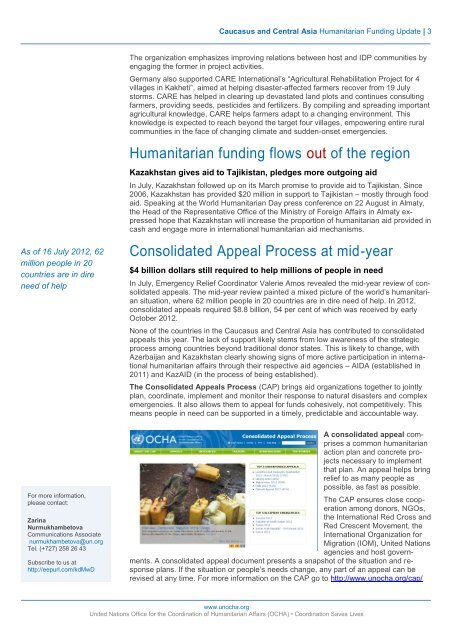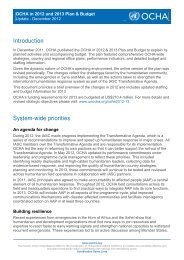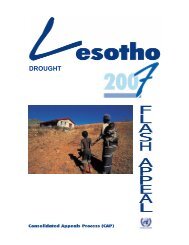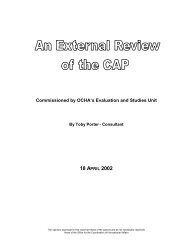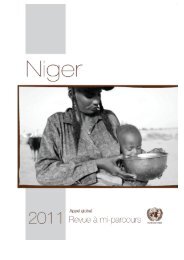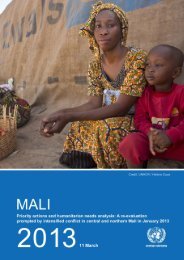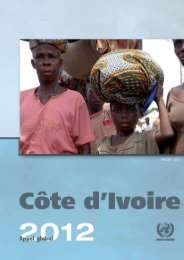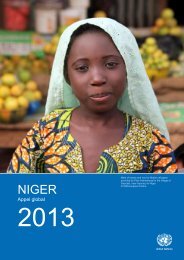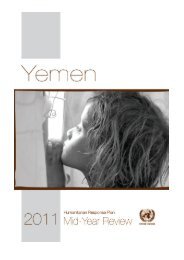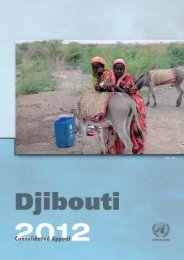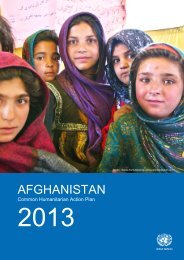BRIEFING KIT
BRIEFING KIT
BRIEFING KIT
- No tags were found...
You also want an ePaper? Increase the reach of your titles
YUMPU automatically turns print PDFs into web optimized ePapers that Google loves.
Caucasus and Central Asia Humanitarian Funding Update | 3As of 16 July 2012, 62million people in 20countries are in direneed of helpThe organization emphasizes improving relations between host and IDP communities byengaging the former in project activities.Germany also supported CARE International’s “Agricultural Rehabilitation Project for 4villages in Kakheti”, aimed at helping disaster-affected farmers recover from 19 Julystorms. CARE has helped in clearing up devastated land plots and continues consultingfarmers, providing seeds, pesticides and fertilizers. By compiling and spreading importantagricultural knowledge, CARE helps farmers adapt to a changing environment. Thisknowledge is expected to reach beyond the target four villages, empowering entire ruralcommunities in the face of changing climate and sudden-onset emergencies.Humanitarian funding flows out of the regionKazakhstan gives aid to Tajikistan, pledges more outgoing aidIn July, Kazakhstan followed up on its March promise to provide aid to Tajikistan. Since2006, Kazakhstan has provided $20 million in support to Tajikistan – mostly through foodaid. Speaking at the World Humanitarian Day press conference on 22 August in Almaty,the Head of the Representative Office of the Ministry of Foreign Affairs in Almaty expressedhope that Kazakhstan will increase the proportion of humanitarian aid provided incash and engage more in international humanitarian aid mechanisms.Consolidated Appeal Process at mid-year$4 billion dollars still required to help millions of people in needIn July, Emergency Relief Coordinator Valerie Amos revealed the mid-year review of consolidatedappeals. The mid-year review painted a mixed picture of the world’s humanitariansituation, where 62 million people in 20 countries are in dire need of help. In 2012,consolidated appeals required $8.8 billion, 54 per cent of which was received by earlyOctober 2012.None of the countries in the Caucasus and Central Asia has contributed to consolidatedappeals this year. The lack of support likely stems from low awareness of the strategicprocess among countries beyond traditional donor states. This is likely to change, withAzerbaijan and Kazakhstan clearly showing signs of more active participation in internationalhumanitarian affairs through their respective aid agencies – AIDA (established in2011) and KazAID (in the process of being established).The Consolidated Appeals Process (CAP) brings aid organizations together to jointlyplan, coordinate, implement and monitor their response to natural disasters and complexemergencies. It also allows them to appeal for funds cohesively, not competitively. Thismeans people in need can be supported in a timely, predictable and accountable way.For more information,please contact:ZarinaNurmukhambetovaCommunications Associatenurmukhambetova@un.orgTel. (+727) 258 26 43Subscribe to us athttp://eepurl.com/kdMwDA consolidated appeal comprisesa common humanitarianaction plan and concrete projectsnecessary to implementthat plan. An appeal helps bringrelief to as many people aspossible, as fast as possible.The CAP ensures close cooperationamong donors, NGOs,the International Red Cross andRed Crescent Movement, theInternational Organization forMigration (IOM), United Nationsagencies and host governments.A consolidated appeal document presents a snapshot of the situation and responseplans. If the situation or people’s needs change, any part of an appeal can berevised at any time. For more information on the CAP go to http://www.unocha.org/cap/www.unocha.orgUnited Nations Office for the Coordination of Humanitarian Affairs (OCHA) • Coordination Saves Lives


